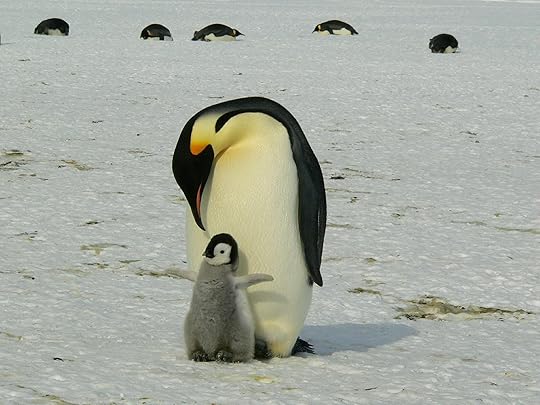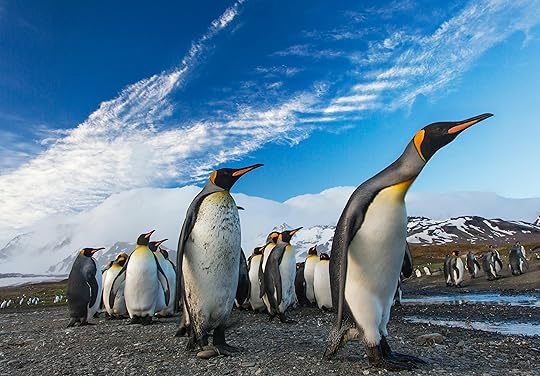Penguin Awareness Day, penguin suits, Penguin books & Welsh
 Image by Siggy Nowak from Pixabay5-minute readPenguins
Image by Siggy Nowak from Pixabay5-minute readPenguinsIt’s #penguinawarenessday today. Which is a jolly good thing since, I suspect, most people other than Pingu fans and naturalists will be blissfully unaware of them for the rest of the year.
I bet you’ll never guess from which language English borrowed penguin. Could it be from those adventurous mariners the Dutch, as their word is pinguïn? Or perhaps from a Polynesian language? Nope, neither of those. It’s most probably from…
…
…
…
…
Welsh.
Which is interesting, because very few Welsh words have entered the mainstream of English, the royal corgi being a highly visible exception.
The Welsh origin is from pen meaning ‘head, headland’ and gwyn meaning ‘white’. And according to the OED etymologists it was probably first applied to the now extinct Great Auk. The pen part features in Penzance, Penmaenmawr and Penrith, and gwyn in the Christian names Gwyn, Gwynn, Gwynne.
Infinite were the Numbers of the foule, wch the Welsh men name Pengwin & Maglanus tearmed them Geese.
That’s an extract, dated 24 August 1577, from the log kept on the Golden Hinde by the priest Francis Fletcher on Sir Francis Drake’s circumnavigation of the world. (‘Maglanus’ we know as Magellan.)
Having waddled into English, the word has dived into other languages such as French pingouin or Russian пингвин (peengveen) or Finnish pingviini. In French, some people use pingouin to mean ‘penguins’, but this is frowned upon by naturalists, since technically it refers to auks. Manchot is the preferred term.
The list at the foot of the Collins entry for penguin shows how most European languages have adopted the word, including Greek πιγκουίνος, but the odd-person-out is Czech with its tučňák. I am reliably informed that’s because it’s a sort of compound consisting of the adjective tučný, ‘fatty’ and the affix –ák, which suggests the referent has the characteristic just named.
We so often use words and phrases that characterise human behaviour in animal terms. Some obvious examples: a nasty man is a swine; a wily one is an old fox; a greedy person is a pig or a gannet, and a treacherous friend is a snake. (Add your own examples here ****************)
Those words above used metaphorically draw on a central conceptual metaphor: PEOPLE ARE ANIMALS.
What’s more, when we liken someone’s behaviour to that of an animal, the behaviour concerned is almost always bad, as the previous examples suggest (The early bird catches the worm is a fairly rare exception).
What we’re doing with that kind of language is making use of the overarching conceptual metaphor BAD HUMAN BEHAVIOUR IS BAD ANIMAL BEHAVIOUR.
Sweeeeeeeet!If you watch footage of penguins moving on land, they look clumsy, comical, almost touchingly vulnerable, quite endearing in their ridiculousness, even sweeeeet. But the metaphor we draw from their behaviour is the opposite of warm or affectionate. As the OED puts it: ‘humorous or derogatory. A man wearing black-and-white evening dress, esp. one having a stiff or pompous demeanour’.
The earliest use comes from that now-defunct engine of lively prose and teenage excitement, Melody Maker, 1 April 1967:
Good Music had the sort of melody and clipping beat that even Victor Sylvester didn’t have to alter so that the Brylcreemed penguins and their sequined partners could jig about in the ballrooms.
Even better, because it suggests pomposity beyond the starchiness, is this from 1996:
When, for the third time, a penguin with attitude announced the absence of a number of menu dishes, I felt distinctly uneasy.
Eat Soup Dec. 45/2
 Photo courtesy of Ian Parker on Unsplash.
Photo courtesy of Ian Parker on Unsplash.Away from the realms of imaginative writing, penguin suit for evening dress and white shirt is a phrase anyone might use. It dates back to the very beginning of the 1960s (I bought myself a penguin suit. M. Terry, Old Liberty 36, 1961), while this next quote neatly epitomises the convention-hating attitude of the decade:
Some smooth bastard in a penguin suit. R. Jeffries Traitor’s Crime iv. 46, 1968.
What was news to me, courtesy of the OED, is that penguin suit can also mean astronauts’ gear:
The astronauts donned the tight-fitting overalls, known as a penguin suit, in which tension is produced by several layers of rubberized material.
N.Y. Times, 10 June 1971
The most visible penguin in people of a certain age’s lives will have been the one on the covers of the hugely successful Penguin paperback series, launched in 1935 and still going strong. It was chosen as the symbol as something ‘dignified but flippant’.
Those paperbacks did not stand up to repeat handling. I remember dutifully covering mine with transparent adhesive plastic (now, memory, just what was it called?) to make them last longer and stop grubby fingerprints or Marmite stains sullying their sunshiny orange. You had to spread the plastic ever so, but ever so carefully to make sure no bubbles or blisters disfigured your book’s synthetic second skin.
Some choice quotations from famous authors referencing the Penguin paperbacks are at the end of this blog.
Meanwhile, English being so footloose – nay, cavalier – with parts of speech, it was inevitable that Penguin books should hatch a verb. Its parent seems to have been a rather snotty GBS in a 1941 letter:
I have had to let Pygmalion be penguined. My days of respectable publishing are over, I fear.
24 Feb. in Coll. Lett. 1926–50 (1988) 597
The phenomenon of Penguining is past its peak; nowadays much fiction and non-fiction appears first in hardback and then paperback, regardless of publisher. In this next quote, the author is looking back to that golden age. But there is a vast range of Penguin Classics.
For an author, to be ‘Penguined’ was a mark of high merit.
J. Sutherland, Bestsellers ii. 30, 2007.
Finally, the Chambers Slang Dictionary and Wiktionary concur that penguin is slang for a nun (black habit, with white wimple, coif, etc.). Wiktionary also claims it is a juggling manoeuvre: ‘A type of catch where the palm of the hand is facing towards the leg with the arm stretched downward, resembling the flipper of a penguin’.
And last of all, Urban Dictionary suggests it describes a way of keeping warm: ‘When two or more people try and stand as close together as possible with both hands in their pockets to avoid cold weather and strong winds’. That is a deeply attractive metaphor, but I have no idea whether people actually use it.
Penguin BooksThe TLS gives them its blessing, 1 August 1935:
We shall look forward to more Penguin Books, and we wish the experiment—a bold one—all success.
Orwell reads a stack of them to while away the time as he sits on a roof in Barcelona in the early days of the Spanish Civil War:
Sometimes I was merely bored with the whole affair, paid no attention to the hellish noise, and spent hours reading a succession of Penguin Library books which, luckily, I had bought a few days earlier; sometimes I was very conscious of the armed men watching me fifty yards away.
Homage to Catalonia x. 177, 1938 (1937)
Dame Iris in the person of one of her characters dismisses Penguin’s polight English fiction:
There were a few Penguin novels, but they looked dull English tea-party stuff.
I. Murdoch, Unofficial Rose v. 51, 1962
And someone writing in The Scotsman skewers the pretensions of a fresher:
A spotty first-year student in faculty scarf and tweed jacket, reading a Penguin Classic while trying to light a brand-new pipe.
Scotsman (Nexis) 11, Nov. 5 2002
“penguin, n.” OED Online, Oxford University Press, December 2020, oed.com/view/Entry/140106. Accessed 13 January 2021.
Chambers Slang Dictionary, Jonathon Green, 2008. Edinburgh: Chambers.
Collins English Dictionary online.
NB: This is an updated version of a post published on Penguin Awareness Day in 2021.



